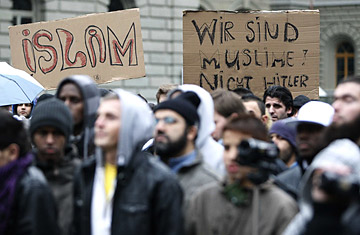
Protesters hold banners reading "Islam" and "We are Muslims, not Hitler" during a rally against the ban on the building of minarets in Switzerland
The recent Swiss referendum vote to ban the building of minarets seemed to confirm a trend: Europeans are becoming increasingly strident in their attempts to "protect" their culture against Islam. However, a newly published report by the Open Society Institute (OSI), a think tank set up by billionaire financier and philanthropist George Soros, details the complex relationship between Muslims and non-Muslim Europeans and reveals that the suspicion is mutual. Muslims believe they are being shut out of European society.
About 20 million Muslims live in the European Union, mostly in capital cities and large industrial towns; they already make up 25% of the population in Marseilles, France, and Rotterdam in the Netherlands; 20% in Malmö, Sweden; 15% in Brussels and Birmingham, England; and 10% in London, Paris and Copenhagen. The report, published on Dec. 15, surveyed Muslims in 11 cities across the E.U. and found that 55% of respondents believed religious discrimination had risen in the past five years. And while many Muslims are a long-standing and integral part of the fabric of their cities, the report says they are still almost three times more likely to be unemployed than non-Muslims. But far from seeking out Islamic ghettos, many Muslim families appear desperately keen to integrate. "A lot of Muslims — especially parents — were sad they could not live in mixed neighborhoods, where they could experience diversity," says Tufyal Choudhury, lead author of the report.
The findings echo earlier research revealing hostility toward Muslims and other minority groups. The Fundamental Rights Agency report, released on Dec. 9, surveyed more than 23,000 individuals from ethnic minority and immigrant groups about their experiences of discrimination, racist crime and policing in the E.U. Minorities commonly face discrimination while looking for a job, shopping or visiting the doctor, according to the report, which labeled as "shocking" the racist, anti-immigrant and Islamophobic experiences of minorities as they go about their daily lives. A 2004 study by Sorbonne sociologist Jean-François Amadieu found that a standard résumé with a Muslim name was five times less likely to elicit an interview than the same résumé with a non-Muslim name.
"We are still at the stage where there are raised suspicions toward Muslims," says Sajjad Karim, a British Muslim member of the European Parliament. "At airports, I quite often get treated differently than my colleagues, even though I hold a British passport."
Such suspicions have boosted support for far-right politicians like the Netherlands' Geert Wilders, whose Freedom Party won 11% of the Dutch vote in June's European elections with an anti-Islam platform. The OSI report says the chilling political climate has alienated Muslims, often making them feel unwanted. Several European countries are tightening their immigration laws, imposing citizenship tests and setting strict rules on wearing headscarves and burqas. Last week, reacting to the Swiss minaret vote, French President Nicolas Sarkozy called on religious practitioners to avoid "ostentation" and "provocation" so as not to upset others.
Douglas Murray, director of the London-based Centre for Social Cohesion think tank, insists that European Muslims face the same discrimination as any newcomers. "All societies are unwelcoming to outsiders, but Europeans have been far more welcoming to Muslims than their critics allow," he says. "The onus of these claims of discrimination always seem to go the same way: to show that Europeans are innately racist. Which is a gross insult."
Perhaps the most revealing aspect of the OSI report may be the diversity of views within Europe's Muslim populations. The report reveals that most Muslims identify strongly with the city and country where they live. In Antwerp, Belgium, for example, over 90% of respondents expressed a "very strong" or "fairly strong" sense of local belonging.
But the levels vary. The report says that Muslims may be better integrated in the U.K. than in other parts of the E.U.: an average 78% of Muslims identified themselves as British, compared with 49% of Muslims who consider themselves French and just 23% who feel German.
Many factors are thought to be behind this. France's troublesome history with its colonies, like Algeria, could explain the greater alienation of its Muslims, many of whom are descended from the colonies. Britain accommodates more cultural needs of its Muslim citizens than any other European country; for example, it allows Muslim policewomen to cover their hair with a headscarf. And in the Netherlands, controversies like the murder of filmmaker Theo van Gogh by a Muslim extremist have "convulsed public opinion," making Muslims "scapegoats for public anxieties over security," the OSI report says.
Yet despite such variations, the report reveals one common thread: Muslim citizens have much the same outlook as non-Muslims in Europe. Like their neighbors, they care about everything from education and housing to cleaner air and safer streets. And they want the same rights and opportunities. "Communities, regardless of faith, have largely the same concerns," says report director Nazia Hussein. "Where they differ is how they are treated and viewed."
